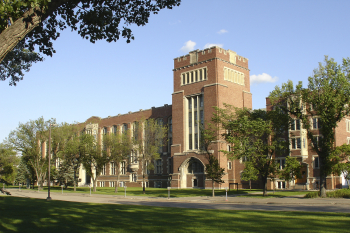Okay, we have several problems in the church, but there's one I'm thinking about specifically today. That problem is the problem, the difficulty of living in the world, but not being of it.
At no time is this more pronounced than at the moment of a worship service on Mother's day. For mother's day, as you may know, is not only a secular observance (which it is), but is also always on a Sunday. And in case you weren't paying attention, the readings that we have in our lectionary don't have much to do with Mothers. In fact, this Sunday, the reading from Acts was all about the stoning of Stephen, the first Christian martyr. Not really one of those coddly mother's day readings.
Now, that's the eternal struggle, isn't it? The eternal struggle that says of us as Christian people that we are looking towards Christ, that he is the be all and end all, but then we find ourselves in a situation in which we look to the culture to tell us what is important. What is important on Sunday? Moms! What's the pastor going to speak about on Sunday? Well, either not moms, or moms if he changes the readings. That's about it.
The Gospel reading isn't about moms though. The Gospel reading was cryptic instead, and featured a line from Jesus that ought to make us at least a little bit uncomfortable. For we as Christians are used to the idea of Jesus as the greatest man who has ever lived, the only person to ever be perfect, flawless, the only person who has ever fulfilled the law, who has ever consistently done what is right and good, who has ever done what is right 100% of the time. That's Jesus for sure. And the rest of us, well, we can't even compete with that, can we? None of the rest of us can hang with that kind of history. The best we can do is to do what Paul does, which is to repent, because the good we want to do is what we avoid, and the evil that we want to avoid is what we end up doing! And yet, Jesus says something in the Gospel reading from Sunday, where he says that those of us who believe in his name will do greater works than him.
Could this be true? This seems like a bit of a problem for us, given that Jesus is top dog who saved all of creation through the redemptive power of his death on the cross. He raised the dead, healed the sick, restored sight to the blind and hearing to the deaf, he did all these things, was right all the time, and still told us that we were going to do greater works than him. Possible how?
Well, what does greater mean? For those of you who were wondering how this would be possible, think on this: The greek word μέγας is great, of course, but means literally 'Any extension in space and in all directions.' Now that's interesting. For it means that we are able to do a larger work than Jesus, not a better one. What could this larger work be, in terms of size and scope? You've noticed by now that there was a Greek word earlier in this paragraph, and it is there because the New Testament was written in Greek. Why was it written in Greek if that wasn't the language of the speakers who were transcribing it? Because it was the language of the intended audience. There is a moment in the Gospels where some Greeks come to see Jesus, and as soon as they do, instead of holding court with them, Jesus begins his journey towards his death. He is set to die at that point, and does not go and minister to the Greeks. His mission is, as he has said, to the lost sheep of the house of Israel, and as soon as the opportunity arises to minister to those outside the house of Israel, outside of the community, the gentiles, he goes to his death. Because Jesus knew something important that we have all assumed.
While he is still here on earth, the faith he is here to create cannot be a global one for all people.
We've all heard it, of course, which is that the stereotypical picture of Jesus that hangs in a great many churches doesn't look like what the real Jesus would have looked like. No kidding.
So that's not what the actual man in Israel would have looked like? I had no idea. Well, of course he wouldn't have looked like that (likely). He also wouldn't have been speaking English. Why do we have the Bible in English if Jesus wasn't speaking English? Because that's the language of the intended audience. Why do we have Jesus looking white in this picture that hangs in North American churches? Because that's what the majority of parishoners look like. And the average suburban church in North American doesn't have a monopoly on this, you know. Consider the following images, all of Jesus.
This is a bigger issue than you think it is, and it's the greater work that Jesus would have us do, as people who believe in him. We are called to be great commission people, and we honestly don't really realize how big of a job that is. For we, as great commission people, are called upon to do the work of evangelizing the world, and it frequently happens one person at a time. Sure, you have moments like you do in the book of Acts, where three thousand came to faith in one day, but you also have moments like that in Timothy, where we hear about Timothy's faith that was passed on to him through his mother and grandmother. And that second one is usually where the heavy lifting of evangelism actually takes place. For it's one thing if you're trying to evangelize a world, a disbelieving world, to bring them into the fold of your faith, but it's quite another to bring those who are of your family into your faith. And if you're one particular type of evangelist, then you evangelize harder than anyone else, because you have so much to lose.
If you're doing door-knocking evangelism, then the people that you meet, who are all presumably nice people, well, if you don't know them then if they reject your message then it doesn't mean that much to you. You tried, you failed, and you move on. If those random strangers reject paradise, well, it just doesn't make that much of a difference to you. But if you are a mother, and you are rabidly, dangerously protective of your child, if you gave birth to that child, and if you are living for that child, to give it life and health and strength, if that child's tiny hands and shell like ears dominate your thoughts, if you would pour your life into that child an hour at a time, if you want them to have everything you could never have, to live better than you do, then you'd do something really important for them.
You'd want them to live forever.
It's usually our mothers, our grandmothers who bring us to baptism in God's house, and more than that, it's our mothers and grandmothers who tend to do the hard work of evangelism, not just getting us 'done,' but also bringing us to the services at God's house, leading us in prayer in the home, praying with us and for us, insisting that we say grace, helping us to read the scriptures, encouraging us in confirmation, and so on. In other words, fulfilling the words of the great commission, to not only baptize, but to teach us to obey everything Christ has commanded us. And that's the greater work. The kind that Christ, by definition could not do, because he cannot and never will be called into that vocation as a mother. It's a greater work in the sense of it being a bigger, a larger work, not a better one. Obviously, we cannot do better work than Jesus Christ of Nazareth, who saved the world, but we can be part of a larger work. Instead of bringing the gospel to 12 men in Israel, we can take it to the ends of the earth. Instead of bringing it to Jerusalem and then to all of Judea, we can bring it to everyone. And instead of going door to door with the message of Christ for a moment, we can go into our own doors, and build the body of Christ in that place, person by person. And that, if it goes to the end of the earth, is a greater work.









